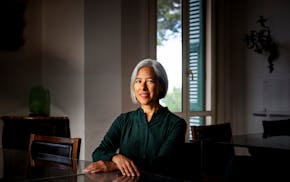Taylor Jenkins Reid has kept busy since publishing her last novel three years ago. In 2023 alone, she produced the hit streaming series based on her novel "Daisy Jones & the Six" and co-wrote the screenplay for the film adaptation of her "One True Loves."
While Hollywood remains all in on Reid's work, with projects based on three of her other novels as well as development on her first original screenplay, Reid isn't abandoning what got her feet in the door. Her ninth novel, "Atmosphere," is a queer love story set in the early years of NASA's space shuttle program, and it's out just in time for summer reading.
The heart of the book is the tender and well-crafted relationship between Joan, an astronomer, and Vanessa, a commercial pilot, who in 1980 are both members of NASA's Astronaut Group 9, just the second time that agency accepted women into the space program. Joan loves the stars, but nothing matters more to her than her adolescent niece Frances, whose mom, Joan's younger sister, is overwhelmed by the demands of being a single parent.
Joan is amiable, effortlessly befriending everyone in her class, and a bit sheltered, never having tried a beer or had a "real boyfriend." Hanging out with her fellow aspiring astronauts, she decides Coors Light is "delicious" but balks when flyboy John Griffin tries to take their study-buddy relationship to the next level.
The reason is obvious to readers and even more obvious to Vanessa. Joan is slow to recognize what — and who — she truly wants, though Vanessa patiently helps her along: "Sometimes I think you and I are having one conversation and then I realize we've been having an entirely different one the whole time, you know that?"
"Atmosphere" is a lighthearted, occasionally melodramatic, romance with a ticking-clock thriller element, but Reid also addresses consequential sociological issues. Women are finally starting to get a seat at the NASA table in the early Reagan years, but the recognition comes with an unreasonable level of scrutiny. Even when Sally Ride becomes the first American woman in space, the pressure on Joan, Vanessa and the other women astronauts remains astronomically high: "There were four men on that shuttle. But every American woman was."
While some men are beginning to understand "that a woman's career, her life, her passions were just as important as their own," the nascent enlightenment is narrow and does not extend to sexuality. NASA still prohibits "sexual deviation," meaning Joan and Vanessa's relationship must remain secret.
The novel called to mind several classic films about NASA, particularly the forgotten gem that is 1986's "SpaceCamp." And while there is as yet no word on whether "Atmosphere" will appear on the big or small screen, the story is seemingly structured with an eye to that eventuality, opening with a harrowing disaster aboard the shuttle Navigator in December 1984, then flashing back several years to tell how everyone got there.
The narrative periodically checks back with the endangered Navigator until the timelines coalesce, but I wish Reid had simply built the tension chronologically. The ultimate outcome of the Navigator plotline is blazingly apparent, so the real tension of "Atmosphere" derives from whether or not Joan can get everything she wants, reaching for the stars while trying not to fall.
Cory Oldweiler is a freelance writer.
Atmosphere
By: Taylor Jenkins Reid.
Publisher: Ballantine Books, 337 pages.

National Book Award winner Susan Choi's new novel is 'Flashlight'

The Big Gigs: 10 top concerts to see in the Twin Cities this week

Travel Troubleshooter: Denied boarding in Spain, but Alaska Airlines won't refund me
Minneapolis writer Kathleen West's new novel is fun. Her mom approves.

